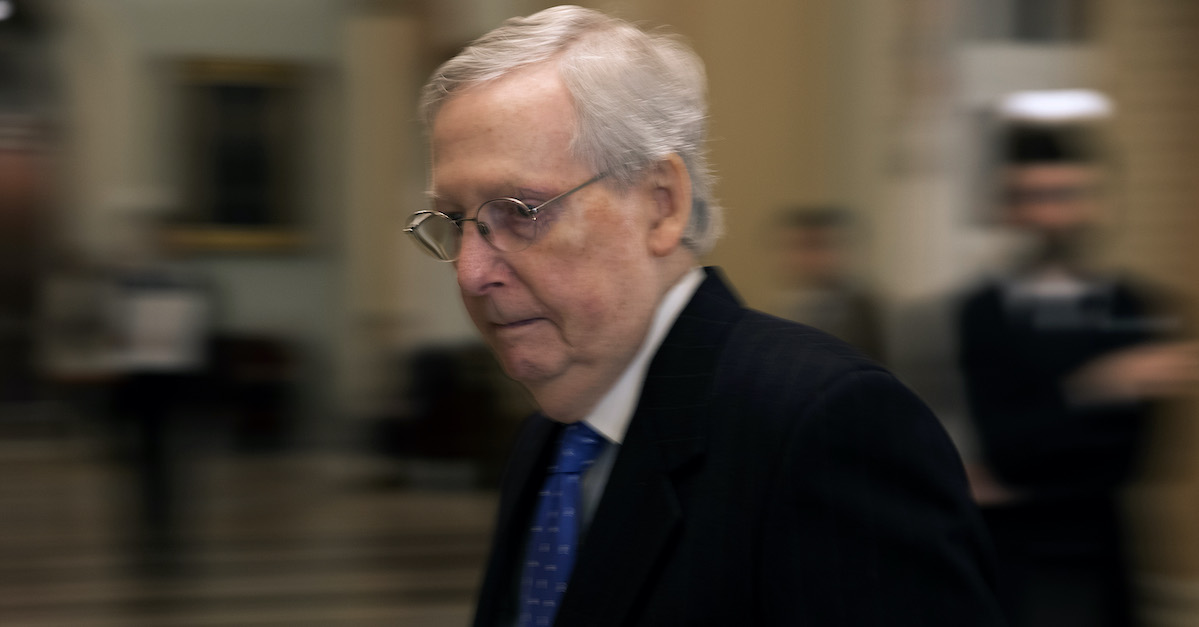
Nearly 300 lawyers signed their names on an open letter to the U.S. Senate on Tuesday that criticizes Senate Majority Leader Mitch McConnell (R-Ky.) for open dereliction of his duty to do “impartial justice” at President Donald Trump’s impeachment trial.
McConnell has already said that there’s no way Trump will be removed from office, acknowledged that he is coordinating with the White House, said that he’s “not an impartial juror,” and said that there’s “not anything judicial about” an impeachment trial in the Senate. And while Democrats say that McConnell wants to speed things up so a show trial can occur without the key witnesses they’ve requested, McConnell has said he wants the rules to be the same as they were during Bill Clinton’s trial. During the Clinton proceedings, the Senate agreed to hear arguments from the prosecution and the defense before voting on whether to call witnesses.
The open letter, which is addressed to all members of the Senate, is clearly an attempt to convince other Republican Senators not to follow in McConnell’s footsteps, as a few defections would matter. The key arguments against McConnell’s positions were these.
1) The Constitution
Just because the Constitution commits the impeachment process to a “political” branch of government and senators may legitimately promote their partisan self-interest as part of the legislative process, does not mean they are permitted to do so when serving as judges and jurors in an impeachment trial. To the contrary, as the adjudicators of impeachment, they have a duty to serve in a quasi-judicial capacity. The Constitution mandates that: “When sitting for that purpose [trying impeachments] they [the Senate] shall be on oath or affirmation.” (See: Const., Art. I, Sect. 3, Clause 6)
2) The Oath Senators Will Swear Before the Trial to Do “Impartial Justice”
The oath that the Senate requires every senator to take before being allowed to participate in an impeachment trial demands that they “solemnly swear or affirm… in all things appertaining to the trial (to) do impartial justice according to the Constitution and law.” (Emphasis added) (See: Procedure and Guidelines for Impeachment Trials in the United States Senate, pp. 25-26 & p. 61)
3) It’s Not True That There’s “Not Anything Judicial” About the Process
The undersigned answered that the language of the Constitution makes clear that impeachment trials are “inherently ‘judicial.'” They argue that it would make no sense to say that there’s nothing judicial about an impeachment trial that the nation’s top judicial officer, Chief Justice John Roberts, will be presiding over:
Similarly, Leader McConnell’s assertion that “[t]here is not anything judicial about [the impeachment process]” is directly refuted by the Constitution. The Judiciary article itself, Article III, expressly manifests that impeachment trials are a category of federal criminal trials: “The trial of all crimes, except in cases of impeachment, shall be by jury [.]” (See: Const., Art. III, Sect. 2, Clause 3). Thus, impeachment trials, being criminal trials, are inherently “judicial.” The judicial nature of impeachment trials is further borne out by other constitutional provisions. By giving “[t]he Senate… the sole power to try all impeachments [,]” (See: Const., Art. I, Sect. 3, Clause 6) the Constitution uses the same word “try” to describe the Senate’s responsibility as our legal system has routinely used to describe the function of courts adjudicating court cases. When the President is impeached, the Constitution does not permit a senator to preside over the trial; it must be our nation’s highest judicial officer, the Chief Justice of the Supreme Court.
The initial sanction required to be imposed on an official found guilty of an impeachable offense is “conviction,” (See: Const., Art. I, Sect. 3, Clause 6 and Const., Art. II, Sect. 4) which is the same initial sanction which courts impose on any guilty criminal defendant. Finally, the Constitution prescribes that when the Senate completes an impeachment trial, it needs to enter “judgment.” (See: Const., Art. I, Sect. 3, Clause 7). This is the same word our legal system uses to describe all courts’ determinations after completing trials in court cases. Thus, the Constitution itself recognizes that a Senate impeachment trial must have multiple elements of a court trial.
The letter concluded by saying that McConnell’s “notion that the impeachment process does not have judicial character and implicitly gives him and other senators free rein to conduct the trial as biased political partisans is indefensible.”
Harvard Law Prof. Laurence Tribe said in a press release on the subject that the letter was meant to underscore the “vital importance of the oath that Senators must take to do ‘impartial justice’ in an impeachment trial and the grave error of arguing that such a trial is a purely political exercise.”
The 287 signatories include law professors, criminal defense attorneys, former prosecutors, former federal and state judges, former state assistant attorneys general, a former U.S. attorney, and so on.
Open Letter to the United States Senate by Law&Crime on Scribd
[Image via Chip Somodevilla/Getty Images]